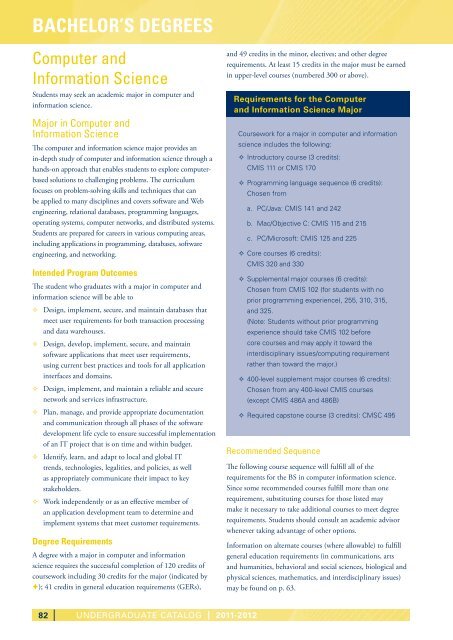Undergraduate Catalog - UMUC Europe
Undergraduate Catalog - UMUC Europe
Undergraduate Catalog - UMUC Europe
You also want an ePaper? Increase the reach of your titles
YUMPU automatically turns print PDFs into web optimized ePapers that Google loves.
BACHELOR’S DEGREES<br />
Computer and<br />
Information Science<br />
Students may seek an academic major in computer and<br />
information science.<br />
Major in Computer and<br />
Information Science<br />
The computer and information science major provides an<br />
in-depth study of computer and information science through a<br />
hands-on approach that enables students to explore computerbased<br />
solutions to challenging problems. The curriculum<br />
focuses on problem-solving skills and techniques that can<br />
be applied to many disciplines and covers software and Web<br />
engineering, relational databases, programming languages,<br />
operating systems, computer networks, and distributed systems.<br />
Students are prepared for careers in various computing areas,<br />
including applications in programming, databases, software<br />
engineering, and networking.<br />
Intended Program Outcomes<br />
The student who graduates with a major in computer and<br />
information science will be able to<br />
G Design, implement, secure, and maintain databases that<br />
meet user requirements for both transaction processing<br />
and data warehouses.<br />
G Design, develop, implement, secure, and maintain<br />
software applications that meet user requirements,<br />
using current best practices and tools for all application<br />
interfaces and domains.<br />
G Design, implement, and maintain a reliable and secure<br />
network and services infrastructure.<br />
G Plan, manage, and provide appropriate documentation<br />
and communication through all phases of the software<br />
development life cycle to ensure successful implementation<br />
of an IT project that is on time and within budget.<br />
G Identify, learn, and adapt to local and global IT<br />
trends, technologies, legalities, and policies, as well<br />
as appropriately communicate their impact to key<br />
stakeholders.<br />
G Work independently or as an effective member of<br />
an application development team to determine and<br />
implement systems that meet customer requirements.<br />
Degree Requirements<br />
A degree with a major in computer and information<br />
science requires the successful completion of 120 credits of<br />
coursework including 30 credits for the major (indicated by<br />
F); 41 credits in general education requirements (GERs),<br />
82<br />
UNDERGRADUATE CATALOG | 2011-2012<br />
and 49 credits in the minor, electives; and other degree<br />
requirements. At least 15 credits in the major must be earned<br />
in upper-level courses (numbered 300 or above).<br />
Requirements for the Computer<br />
and Information Science Major<br />
Coursework for a major in computer and information<br />
science includes the following:<br />
G Introductory course (3 credits):<br />
CMIS 111 or CMIS 170<br />
G Programming language sequence (6 credits):<br />
Chosen from<br />
a. PC/Java: CMIS 141 and 242<br />
b. Mac/Objective C: CMIS 115 and 215<br />
c. PC/Microsoft: CMIS 125 and 225<br />
G Core courses (6 credits):<br />
CMIS 320 and 330<br />
G Supplemental major courses (6 credits):<br />
Chosen from CMIS 102 (for students with no<br />
prior programming experience), 255, 310, 315,<br />
and 325.<br />
(Note: Students without prior programming<br />
experience should take CMIS 102 before<br />
core courses and may apply it toward the<br />
interdisciplinary issues/computing requirement<br />
rather than toward the major.)<br />
G 400-level supplement major courses (6 credits):<br />
Chosen from any 400-level CMIS courses<br />
(except CMIS 486A and 486B)<br />
G Required capstone course (3 credits): CMSC 495<br />
Recommended Sequence<br />
The following course sequence will fulfill all of the<br />
requirements for the BS in computer information science.<br />
Since some recommended courses fulfill more than one<br />
requirement, substituting courses for those listed may<br />
make it necessary to take additional courses to meet degree<br />
requirements. Students should consult an academic advisor<br />
whenever taking advantage of other options.<br />
Information on alternate courses (where allowable) to fulfill<br />
general education requirements (in communications, arts<br />
and humanities, behavioral and social sciences, biological and<br />
physical sciences, mathematics, and interdisciplinary issues)<br />
may be found on p. 63.






